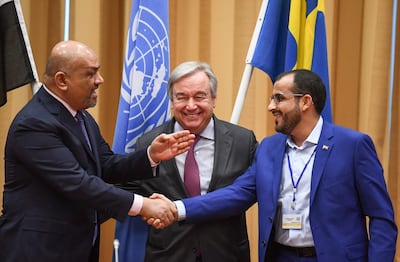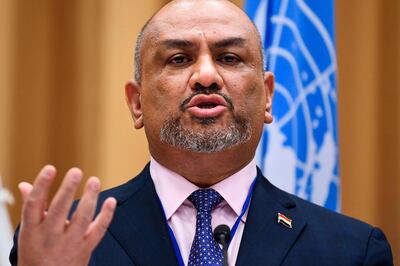Yemen's warring parties have agreed to withdraw all forces from Hodeidah governorate and its vital harbours as part of a wider ceasefire agreement, UN chief Antonio Guterres said on Thursday, as UN-backed peace consultations in the rural Swedish town of Rimbo draw to a close.
Mr Guterres also said a framework for political negotiations would be discussed at the next round of talks between the Iranian-aligned Houthis and the Saudi-backed government of President Abd-Rabbu Mansour Hadi.
Thursday's landmark agreement marks the first time in years that warring parties have taken significant strides towards building peace and alleviating the suffering of the Yemeni people, Yemeni Foreign Minister Khalid Al Yamani told The National following the announcement.
“We have shown the international community that we are serious in achieving peace and ending the suffering of millions of Yemenis,” he said, describing Thursday’s development as a “huge achievement.”

The UAE's Minister of State for Foreign Affairs Dr Anwar Gargash described the development as "encouraging," and said that "the diplomatic progress was made possible by sustained military pressure against the Houthis along the Red Sea and around Hodeidah.”
In a briefing before talks closed, Mr Guterres said the ceasefire agreement covers all of Hodeidah governorate and demands the “withdrawal of all forces,” from both the city and Hodeidah’s main port.
"In the harbour the UN will assume a very important monitoring role and in the city the order will be maintained by the local forces," he added, referring to forces recognised by the Yemeni government.
He said that he expects forces will start withdrawing "within days" from three key ports in Hodeidah governorate before both government and rebel forces begin disengaging in the city.

The three ports, named by the UN head, are Al Hodeidah, Al Salif and Ras Issa. They are the main entry points for food and aid shipments to Yemen.
A Redeployment Coordination Committee including both sides will oversee the ceasefire and withdrawal, according to the agreement. It will be chaired by the UN and report weekly to the UN Security Council.
International monitors will be deployed in Hodeidah city and the three ports, and all armed forces are due to pull back completely within 21 days of the ceasefire coming into force. Another joint committee overseen by the United Nations will set up humanitarian corridors to Taiz, Yemen's third city.
Yemen’s foreign minister described the agreement as a “victory.”
“The victory here is that the militias are going to withdrawal from Hodeidah, this is new and very important and we hope that the Yemeni people are able to celebrate,” Mr Al Yamani told The National.
Yemen FM talks about Hodeidah agreement- historic and first agreement in the history of this bloody and tragic war @KhaledAlyemany pic.twitter.com/YNGXmkJAGF
— Mina Aldroubi (@Mina_Aldroubi) December 13, 2018
He cautioned, however, that a military withdrawal from Hodeidah remains "hypothetical" until rival rebels pull out. He said the government and the coalition will give rebels a period of 20 days to withdraw from Hodeidah and allow forces affiliated with the Yemeni government to deploy around the governorate.
“This is a testing time for the international community and the security council, we will wait 20 days and we will see how far we can go to implement the Hodeidah initiative,” Mr Al Yamani said.
In a reminder of the tense situation on the ground, Houthi rebels attacked a village in southern Hodeidah just hours after the announcement in Sweden, forcing dozens of families to leave their homes.
The Red Sea port city has been the objective of a government offensive against Houthi rebels since June. Fighting in the port city could trigger a new humanitarian crisis in Yemen, where the UN estimates 14 million people face imminent starvation.
An end to fighting in Hodeidah, which is home to 150,000 people and a vital conduit for aid across Yemen, will facilitate the delivery of humanitarian relief to the area’s suffering population.
The diplomatic progress was made possible by sustained military pressure against the Houthis along the Red Sea and around Hodeida. The Coalition has held its commitment to maintain the flow of humanitarian assistance and to avoid damaging the port.
— د. أنور قرقاش (@AnwarGargash) December 13, 2018
Thursday’s announcement capped a week of talks between Yemen’s warring parties in Sweden, during which rivals also agreed on a prisoner exchange deal. However, there has not been agreement on a ceasefire in the rest of Yemen beyond Hodeidah, the UN chief added. An agreement on Sanaa airport was expected within a week, he said.
Rebel negotiator Mohammed Abdel Salam told reporters that the Houthis are happy with what was achieved in the consultations and said rebels have agreed in principle on a UN role in Sanaa airport, which would include carrying out safety and inspection checks.
Also, no agreement had been reached on a political framework. The issue will be discussed during a second round of talks at the end of January, Mr Guterres said, lauding rival parties for what he called "an important step" and "real progress toward future talks to end the conflict."

Mr Al Yamani told The National that his government is not interested in side-lining rebels from Yemen's political future. "The Houthis will part of the Yemen’s political framework," he said.
However, he demanded that they cut ties with Iran and it's proxies before the government considers their participation in cabinet. "We will live together under one roof, even though we may have political or religious differences, but Yemen is for all," he said.
In a highly symbolic gesture, Mr Al Yamani and Mr Abdel Salam shook hands to loud applause in the closing session.
“This is what I said to the UNSG [UN Secretary General] when he tried to get me closer to Mohammed Abdel Salam: 'You don’t have to get us closer, because he’s my brother. Despite his coup on the state, his destruction of the country and his responsibility in triggering the humanitarian disaster – he remains my brother," Mr Yamani said on Twitter.
____________
Yemen talks
UAE welcomes breakthrough in Yemen peace talks
A lonely fight for Yemen’s only female delegate to UN-backed talks
What we know about the Hodeidah ceasefire
____________
The ambassadors to Yemen from the five permanent member states of the UN Security Council issued a joint statement after the announcement of the deal, in which they commended "both parties for setting aside their differences, engaging in good faith and cooperating with the Special Envoy to achieve progress in a number of important areas which will have an immediate and significant positive impact upon the lives of the people of Yemen, and serve to build trust between the parties for an enduring comprehensive political settlement."
The fighting in Yemen has produced one of the world's worst humanitarian crises, with 22 of Yemen's 29 million people in need of aid, according to the United Nations. The two sides have for months been locked in a stalemated fight over Hodeida.
The US-based Armed Conflict Location & Event Data Project, or ACLED, said in a report Tuesday that more than 28,000 people — again both civilians and combatants — were killed in the first 11 months of 2018, an increase of 68 per cent from 2017. More than 3,000 were killed in November, the deadliest month since ACLED started collecting data.
The group said 37 per cent of the total number of civilians killed in Yemen in 2018 died in Hodeida. ACLED bases its figures on press reports of each incident of violence in the war.
ACLED's figures also do not include the last few months of 2014, when Yemen's Houthi rebels captured Sanaa and much of the country's north, nor the casualties in 2015, when the Saudi-led coalition joined the war on the side of President Abed Rabbo Mansour Hadi's government.
____________
Beyond the Headlines Podcast: Yemenis continue to suffer as warring sides negotiate




